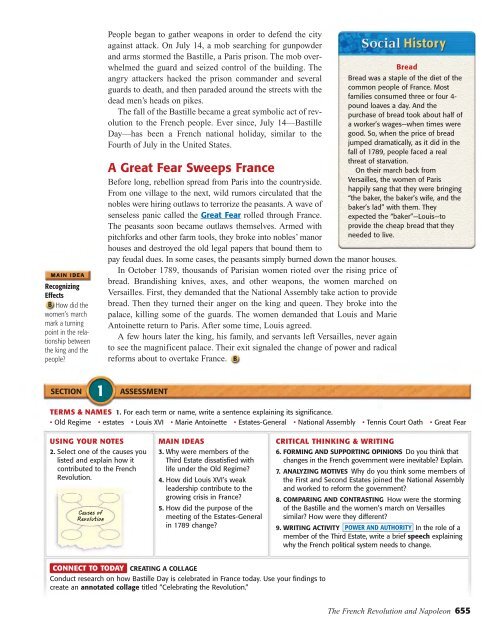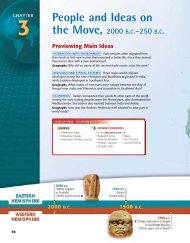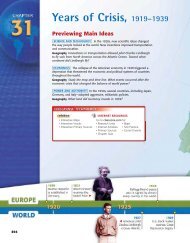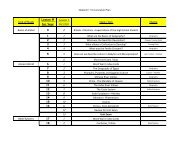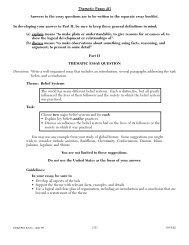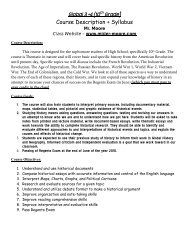The French Revolution and Napoleon, 1789-1815 - First
The French Revolution and Napoleon, 1789-1815 - First
The French Revolution and Napoleon, 1789-1815 - First
Create successful ePaper yourself
Turn your PDF publications into a flip-book with our unique Google optimized e-Paper software.
Recognizing<br />
Effects<br />
How did the<br />
women’s march<br />
mark a turning<br />
point in the relationship<br />
between<br />
the king <strong>and</strong> the<br />
people?<br />
People began to gather weapons in order to defend the city<br />
against attack. On July 14, a mob searching for gunpowder<br />
<strong>and</strong> arms stormed the Bastille, a Paris prison. <strong>The</strong> mob overwhelmed<br />
the guard <strong>and</strong> seized control of the building. <strong>The</strong><br />
angry attackers hacked the prison comm<strong>and</strong>er <strong>and</strong> several<br />
guards to death, <strong>and</strong> then paraded around the streets with the<br />
dead men’s heads on pikes.<br />
<strong>The</strong> fall of the Bastille became a great symbolic act of revolution<br />
to the <strong>French</strong> people. Ever since, July 14—Bastille<br />
Day—has been a <strong>French</strong> national holiday, similar to the<br />
Fourth of July in the United States.<br />
A Great Fear Sweeps France<br />
Before long, rebellion spread from Paris into the countryside.<br />
From one village to the next, wild rumors circulated that the<br />
nobles were hiring outlaws to terrorize the peasants. A wave of<br />
senseless panic called the Great Fear rolled through France.<br />
<strong>The</strong> peasants soon became outlaws themselves. Armed with<br />
pitchforks <strong>and</strong> other farm tools, they broke into nobles’ manor<br />
houses <strong>and</strong> destroyed the old legal papers that bound them to<br />
pay feudal dues. In some cases, the peasants simply burned down the manor houses.<br />
In October <strong>1789</strong>, thous<strong>and</strong>s of Parisian women rioted over the rising price of<br />
bread. Br<strong>and</strong>ishing knives, axes, <strong>and</strong> other weapons, the women marched on<br />
Versailles. <strong>First</strong>, they dem<strong>and</strong>ed that the National Assembly take action to provide<br />
bread. <strong>The</strong>n they turned their anger on the king <strong>and</strong> queen. <strong>The</strong>y broke into the<br />
palace, killing some of the guards. <strong>The</strong> women dem<strong>and</strong>ed that Louis <strong>and</strong> Marie<br />
Antoinette return to Paris. After some time, Louis agreed.<br />
A few hours later the king, his family, <strong>and</strong> servants left Versailles, never again<br />
to see the magnificent palace. <strong>The</strong>ir exit signaled the change of power <strong>and</strong> radical<br />
reforms about to overtake France.<br />
SECTION 1 ASSESSMENT<br />
TERMS & NAMES 1. For each term or name, write a sentence explaining its significance.<br />
• Old Regime • estates • Louis XVI • Marie Antoinette • Estates-General • National Assembly • Tennis Court Oath • Great Fear<br />
USING YOUR NOTES<br />
2. Select one of the causes you<br />
listed <strong>and</strong> explain how it<br />
contributed to the <strong>French</strong><br />
<strong>Revolution</strong>.<br />
Causes of<br />
<strong>Revolution</strong><br />
MAIN IDEAS<br />
3. Why were members of the<br />
Third Estate dissatisfied with<br />
life under the Old Regime?<br />
4. How did Louis XVI’s weak<br />
leadership contribute to the<br />
growing crisis in France?<br />
5. How did the purpose of the<br />
meeting of the Estates-General<br />
in <strong>1789</strong> change?<br />
CONNECT TO TODAY CREATING A COLLAGE<br />
Conduct research on how Bastille Day is celebrated in France today. Use your findings to<br />
create an annotated collage titled “Celebrating the <strong>Revolution</strong>.”<br />
Bread<br />
Bread was a staple of the diet of the<br />
common people of France. Most<br />
families consumed three or four 4pound<br />
loaves a day. And the<br />
purchase of bread took about half of<br />
a worker’s wages—when times were<br />
good. So, when the price of bread<br />
jumped dramatically, as it did in the<br />
fall of <strong>1789</strong>, people faced a real<br />
threat of starvation.<br />
On their march back from<br />
Versailles, the women of Paris<br />
happily sang that they were bringing<br />
“the baker, the baker’s wife, <strong>and</strong> the<br />
baker’s lad” with them. <strong>The</strong>y<br />
expected the “baker”—Louis—to<br />
provide the cheap bread that they<br />
needed to live.<br />
CRITICAL THINKING & WRITING<br />
6. FORMING AND SUPPORTING OPINIONS Do you think that<br />
changes in the <strong>French</strong> government were inevitable? Explain.<br />
7. ANALYZING MOTIVES Why do you think some members of<br />
the <strong>First</strong> <strong>and</strong> Second Estates joined the National Assembly<br />
<strong>and</strong> worked to reform the government?<br />
8. COMPARING AND CONTRASTING How were the storming<br />
of the Bastille <strong>and</strong> the women’s march on Versailles<br />
similar? How were they different?<br />
9. WRITING ACTIVITY POWER AND AUTHORITY In the role of a<br />
member of the Third Estate, write a brief speech explaining<br />
why the <strong>French</strong> political system needs to change.<br />
<strong>The</strong> <strong>French</strong> <strong>Revolution</strong> <strong>and</strong> <strong>Napoleon</strong> 655


